Fleurs du Mal Magazine


Or see the index
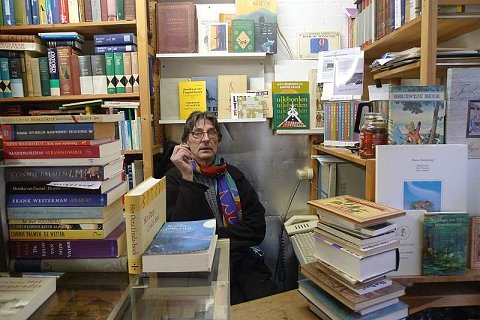
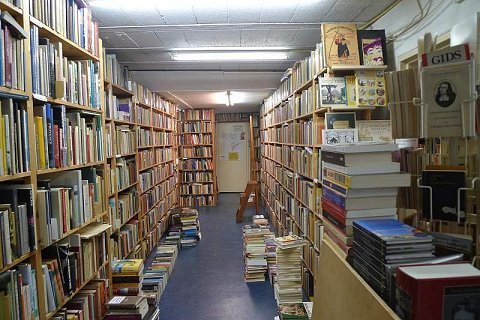
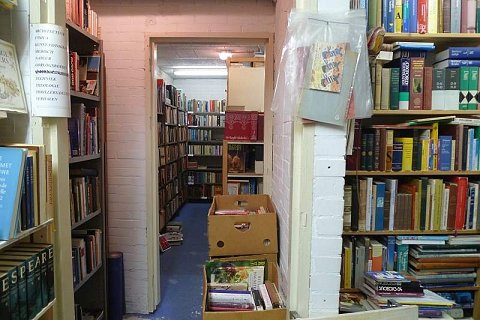
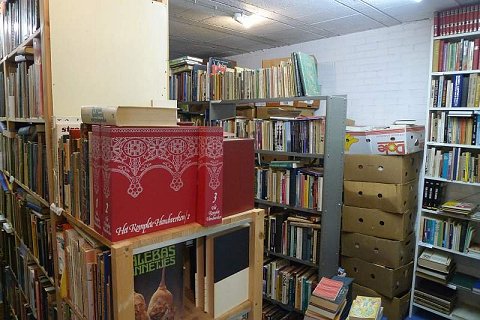
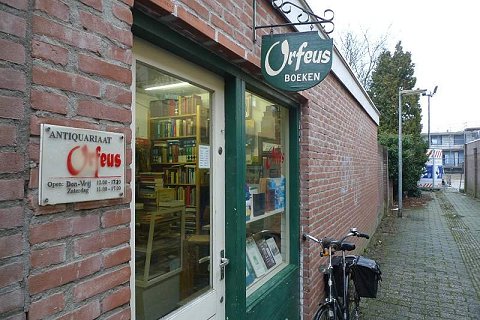
Joep Eijkens
Orpheus leeft nog
Hoe vaak is het de laatste jaren al niet gebeurd dat je aan een definitief gesloten deur kwam waar je een antiquariaat verwachtte? Steeds meer tweedehandsboekhandelaren leggen het loodje of gaan uitsluitend nog op internet verder. Maar er zijn volhouders en één van hen heet Adrie Krijgsman. Hij runt al jaren een bescheiden antiquariaat in Assen. Het zaakje, gelegen aan een nogal verlopen winkelsteegje, is genoemd naar Orpheus, de beroemde zanger en dichter uit de Griekse mythologie die zo gruwelijk aan zijn eind kwam.
Ik kom er niet vaak, hooguit vier keer per jaar. Afgelopen weekend was ik er weer. “Hoe gaat het?”vroeg ik Adrie. “Met mij gaat het goed”, antwoordde hij, “Maar met de zaken…” Goed, hij was nog niet gestopt zoals zijn collega’s aan de Roldestraat.” Maar ik heb ook een lagere huur.” Het was het bekende verhaal: teveel concurrentie van een toenemend aantal aanbieders, van particulieren tot kringloopbedrijven. “Wist je dat in Assen alleen al een stuk of zeven kringloopbedrijven zitten?”
Niettemin hield hij hoop: misschien zou hij wat meer aanloop krijgen als het nabijgelegen nieuwe winkelcentrum openging.
Toen ik aanstalten maakte om te vertrekken – ik had helaas niets van mijn gading gevonden – bood hij me opeens een boekje aan. Een boekje van eigen hand. Zijn zesde gedichtenbundel, schraal grondgebied getiteld. In het Nieuwsblad van het Noorden kreeg de bundel een goede recensie, vertelde hij. “Drie sterren.” Of ik er ook aandacht aan zou kunnen besteden?
Thuis door het hoekje bladerend valt mijn oog op het gedicht bij lege winkel. Dat gaat zo:
bij lege winkel
staat
vanaf de stille straat
in een verscholen hoek
nog steeds haar damesfiets
met loshangend slot
donkergroen frame
een weggeworpen blikje
tegen de voorband
herfstbladeren
koude mist
zuigt in de middag
novemberlicht weg
langs kusten van roze graniet
vliegen onverstoorbare meeuwen
valt al de eerste sneeuw
Het zou me niet verbazen dat de dichter zijn inspiratie in zijn eigen steegje heeft gevonden, wie weet kijkend naar de grauwe hemel boven Assen even wegdromend naar een vakantie in Bretagne…
Het mooi sober vormgegeven boekje kwam uit in een oplage van 50 exemplaren en is verkrijgbaar via www.adriekrijgsman.nl
Photos & text© Joep Eijkens
fleursdumal.nl magazine
More in: - Bookstores, Joep Eijkens, Joep Eijkens Photos

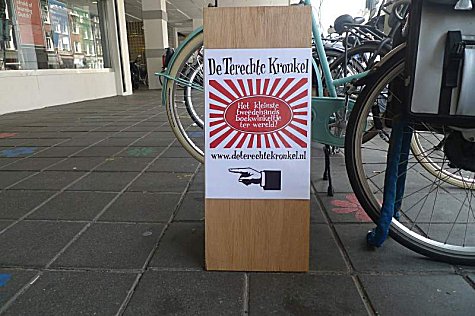
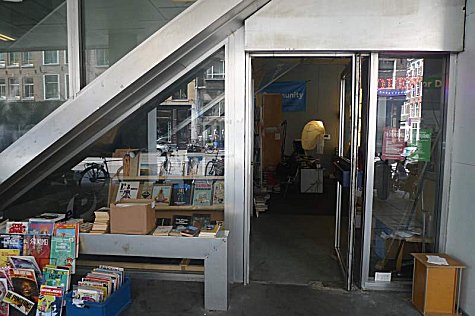

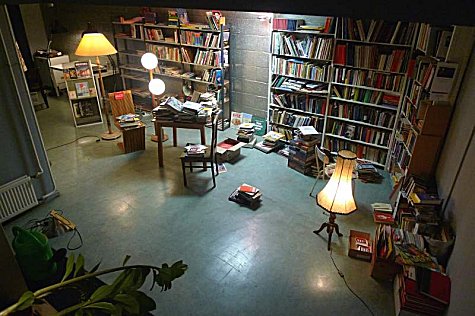
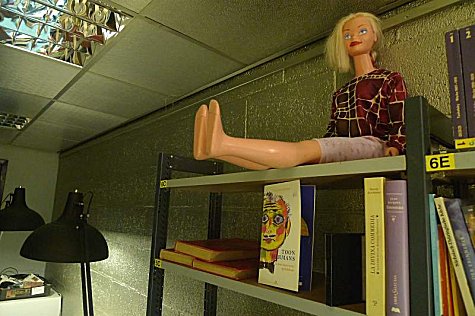
De Terechte Kronkel
‘De Terechte Kronkel’ heet het zaakje. Ik liep er toevallig langs op zoek maar een andere winkel aan de Amsterdamse Vijzelstraat . ‘Het kleinste tweedehandsboekwinkeltje ter wereld!’ riep een bord op het trottoir. Binnen zaten twee heren te discussiëren in een tamelijk duistere ruimte. Eén van hen bleek de eigenaar te zijn, Frans de Jong, en die vertelde dat hij hier maar tijdelijk zat.
Natuurlijk had de naam van zijn zaak te maken met het pseudoniem van Simon Carmiggelt. En natuurlijk had hij veel werk in voorraad van de grote Amsterdamse schrijver. Maar De Jong vond fotoboeken ook interessant en wilde zich meer gaan specialiseren in die categorie. Nou, hij is al op de goede weg, want ik vond een voor mij onbekend boekje van Spencer Tunick, de New Yorkse fotograaf die bekend werd door zijn foto’s van grote massa’s naakte mensen.
Of De Jongs ‘antiquariaatje’ echt het kleinste ter wereld is, waag ik te betwijfelen. Ik meen in Luik wel eens een tweedehandsboekenzaakje bezocht te hebben ter grootte van een ruime inloopkast. In elk geval bleek hier een trap te leiden naar een souterrain waar ook behoorlijk wat te snuffelen viel. Boven een boek van Toon Hermans zat een grote meisjespop te lachen om niets. Kronkel zou er misschien een mooi verhaal over hebben kunnen schrijven.
Joep Eijkens
fleursdumal.nlmagazine
joep eijkens© photos & text 2012
More in: - Bookstores, Joep Eijkens Photos
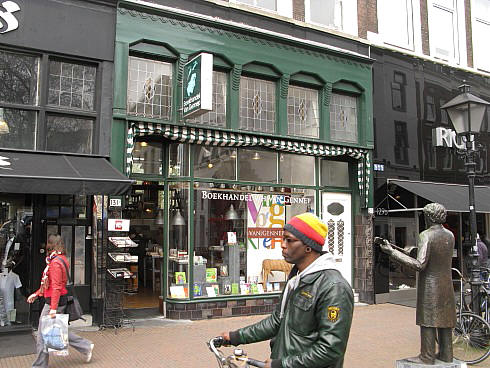
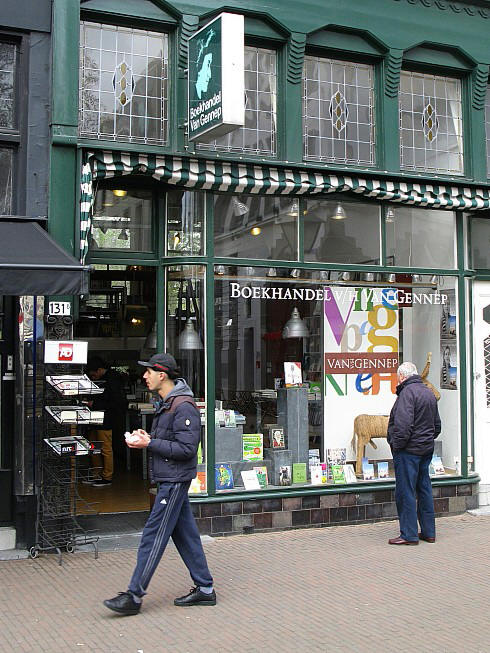
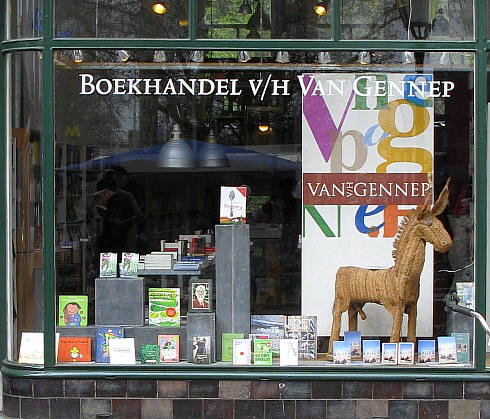
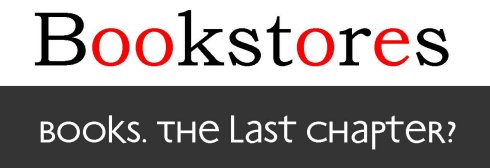
Bookstores: Boekhandel v/h Van Gennep
Oude Binnenweg 131b – 3012 JD Rotterdam
Books. The last chapter? Photos: anton k. 2012
kempis.nl poetry magazine
More in: - Bookstores
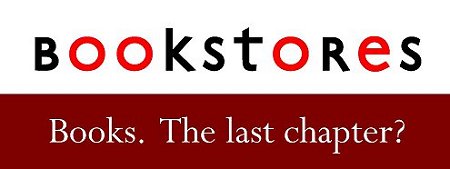
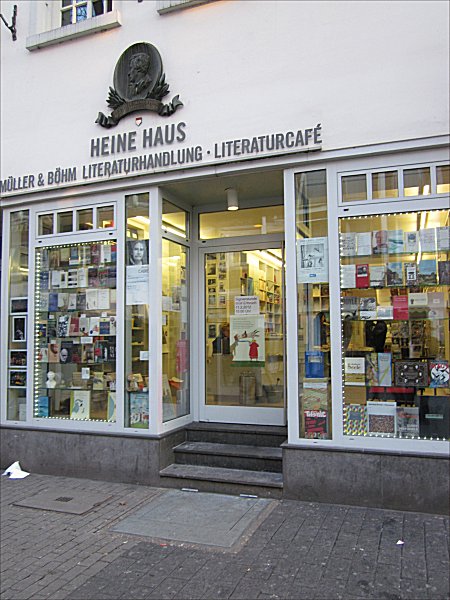
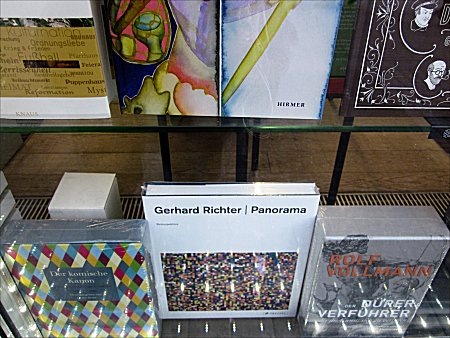

Books. The last chapter?
Bookstores :
Müller & Böhm – Literaturhandlung im Heine Haus
Bolkerstraße 53, Düsseldorf
photos: kemp=mag 2012
kempis.nl poetry magazine
More in: - Bookstores

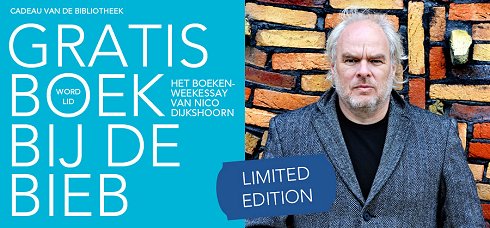
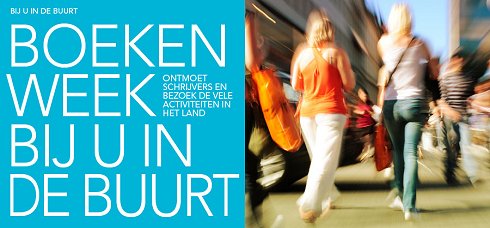
Boekenweek 2012
14 – 24 maart 2012
Thema: Vriendschap en andere ongemakken
fleursdumal.nl magazine
More in: - Book Lovers, - Bookstores, Art & Literature News, Boekenweek

Bookshop Shakespeare and Company in Paris
Death of George Whitman
On Wednesday 14th December, 2011, George Whitman died peacefully at home in the apartment above his bookshop, Shakespeare and Company, in Paris. George suffered a stroke two months ago, but showed incredible strength and determination up to the end, continuing to read every day in the company of his daughter, Sylvia, his friends and his cat and dog. He died two days after his 98th birthday.
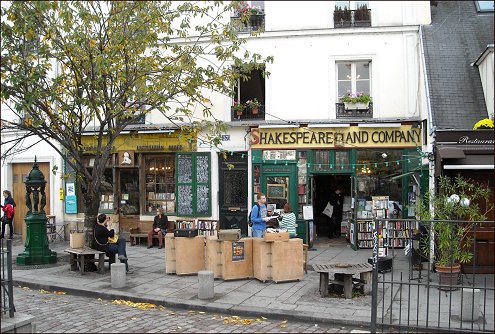
George Whitman was born on December 12, 1913 to mother Grace Bates and father Walter George Whitman in East Orange, New Jersey. When George was still a baby the family moved to Salem, Massachusetts. Early in his life George’s parents instilled in him a passionate and profound respect for literature. Walter was a well-respected professor of physics and the author of several books on science in the home and community. In 1925, when George was twelve years old, Walter took the whole family (except the youngest son Carl) on a year-long sabbatical to Nanking University in China. Immersed in Chinese culture and society, George and his younger sister Mary learned the language quite quickly. It was his first trip abroad, and his experiences in China made a lasting impression on him.
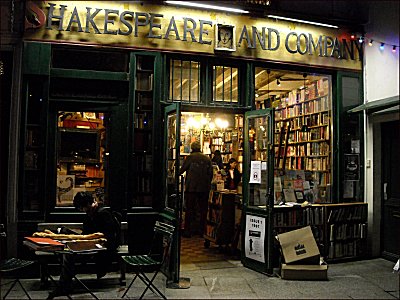
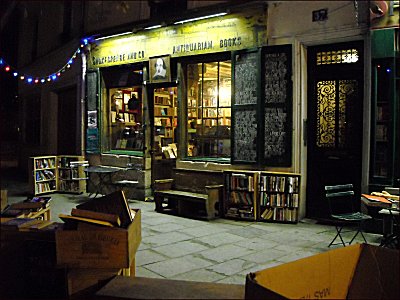
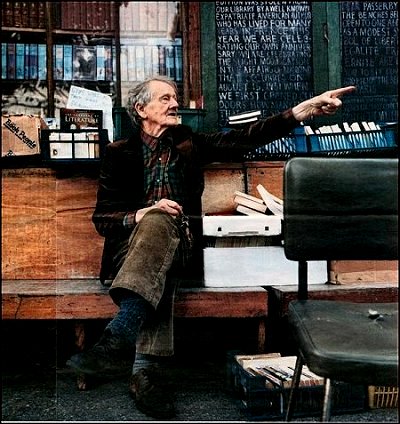
George Whitman
With the brief exception of the Nanking exchange, George lived in Salem until he graduated from high school. While he was a student he published and edited his own satirical paper called “The Reflector” and also worked as a newsboy. In 1931 George decided to enroll as an undergraduate at Boston University with a major in journalism. After his graduation in 1935 he decided to travel again. With $40 in his pocket he caught a ride to Mexico city and began a voyage that was to trace almost 5000 kilometers through Mexico and Central America, including the Honduras, Guatemala, Costa Rica, and Hawaii. During this time he became fluent in Spanish.
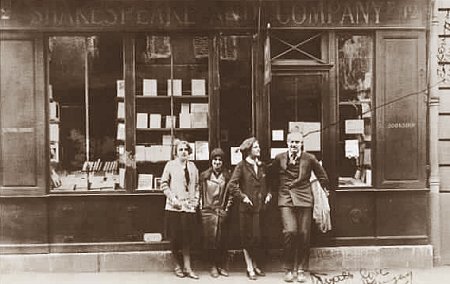
Ernest Hemingway (right)
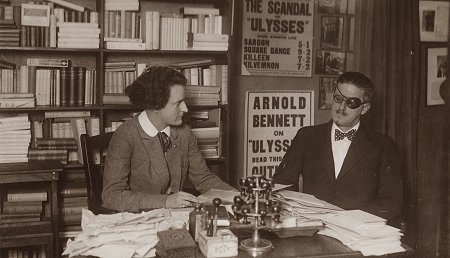
Sylvia Beach and James Joyce
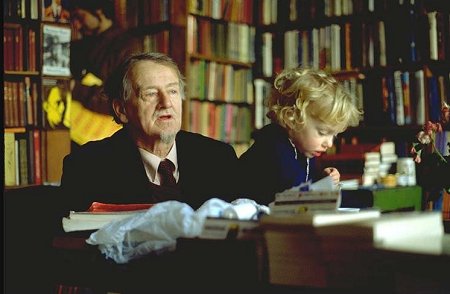
George Whitman and daughter Sylvia
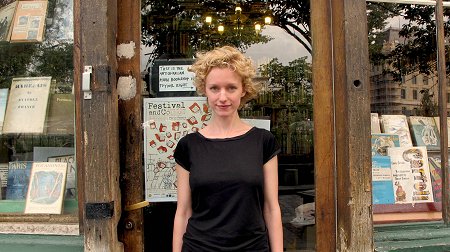
Sylvia Whitman
This trip was a formative experience in George’s life. Much of his traveling was done alone and on foot. He had many adventures and close calls. In an isolated part of the Yucatan he fell sick with dysentery and was forced to walk alone for three days through the swampy jungle with no food or water. Eventually he was found and nursed back to health by a tribe of Mayans. George was deeply impressed by the fact that despite hardship and extreme poverty, the people he met were invariably friendly and generous. This philosophy of “give what you can, take what you need” would become one of his founding principles.
When he arrived in Panama George ran out of money. He found a job working with the Panama Canal Company, where he stayed for several months before sailing to Hawaii and then to San Francisco in 1938, where he worked as a cable car conductor, attended classes at the University of California and enlisted in the US Army. He didn’t stay out west for long but decided to hobo his way back east, riding the rails until he arrived back in Massachussets. In 1939 he enrolled at Harvard University, where he stayed until 1941 when he was called into military service. He was trained as a Medical Warrant Officer and worked at different hospitals around Europe, helping with the wounded. Several months of his army career were spent at an isolated post in Greenland. He lived with the natives, learned to sail, and according to George, had a beautiful Eskimo girlfriend.
Returning to the United States, George managed to open and run a small bookstore in Taunton, Massachusetts while still working night shifts for the army until the war ended and he was discharged. After more travels through western Europe and France, George moved permanently to Paris in 1948 under the GI Bill. He lived in a small room in the Hotel Suez on Boulevard St. Michel in the heart of the Left Bank and enrolled at the Sorbonne, studying French civilization, philosophy, culture, and literature. Encouraged by his great friend Lawrence Lawrence Ferlinghetti, George founded his bookshop, Le Mistral, at 37 rue de la Bûcherie in 1951. The name, he says, “was in honour of the first girl I ever fell in love with.” Inspired by his encounters with the legendary bookseller Sylvia Beach, he later changed the name of his shop to Shakespeare and Company. In 1981 George’s only daughter was born at the Hôtel Dieu, directly across the Seine from the bookshop. She was respectfully named after Sylvia Beach.

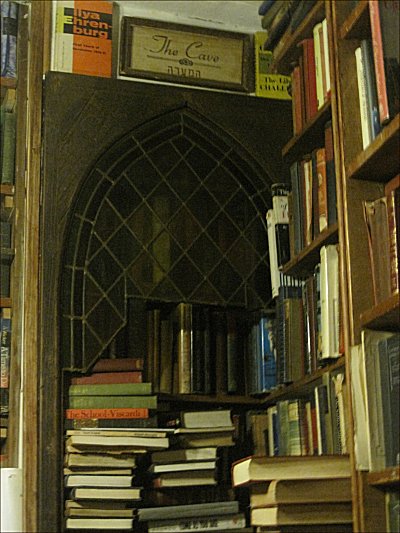
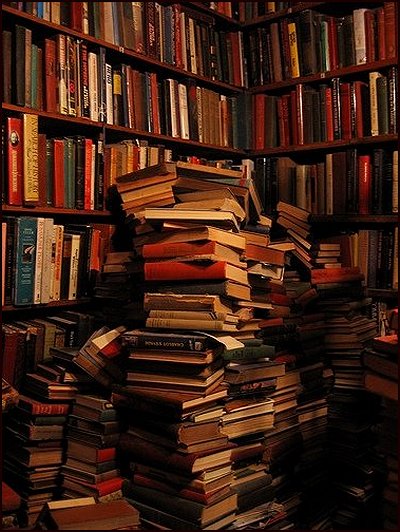

For 60 years George worked tirelessly to ensure that Shakespeare and Company remains not only a venerable independent bookshop, but also a renowned Left Bank cultural institution and a home-away-from-home for many thousands of writers and visitors from around the world. In 2006 he was awarded the Officier des Arts et Lettres by the French Minister of Culture for his lifelong contribution to the arts.
On Wednesday 14th December, 2011, George Whitman died at home in the apartment above his bookshop, Shakespeare and Company, in Paris. George suffered a stroke two months before, but showed incredible strength and determination up to the end, continuing to read every day in the company of his daughter, Sylvia, his friends and his cat and dog. He died two days after his 98th birthday.
After a life entirely dedicated to books, authors and readers, George will be sorely missed by all his loved ones and by bibliophiles around the world who have read, written and stayed in his bookshop for over 60 years. Nicknamed the Don Quixote of the Latin Quarter, George will be remembered for his free spirit, his eccentricity and his generosity – all three summarised in the verses written on the walls of his open, much-visited library : “Be not inhospitable to strangers / Lest they be angels in disguise.”
George was buried at the Père Lachaise cemetery in Paris, in the good company of other men and women of letters such as Guillaume Apollinaire, Colette, Oscar Wilde and Balzac. His bookstore continues, run by his daughter Sylvia.
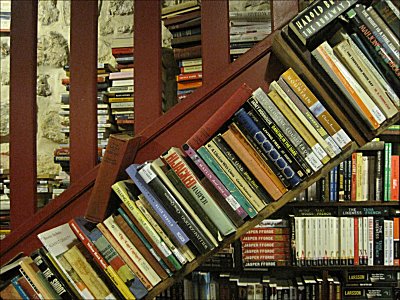
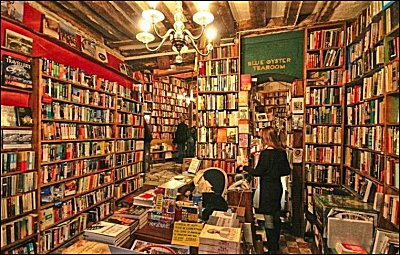
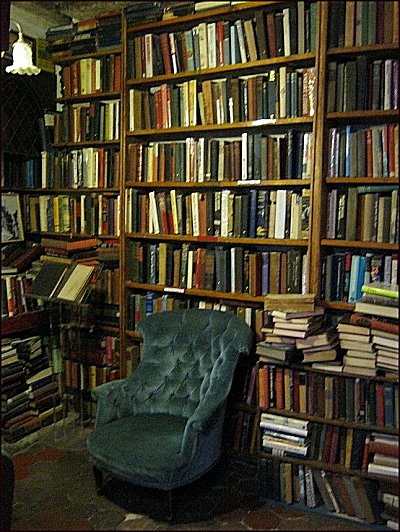

Shakespeare and Company, 37 Rue Bûcherie, 75005 Paris, France
photos 1-3 jef van kempen + photos archive shakespeare & company
≡ Website Shakespeare & Company Paris
Books. The final chapter?
kempis.nl poetry magazine
More in: - Bookstores, FDM in Paris
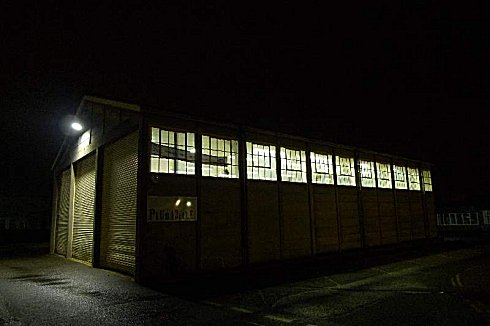
.jpg)
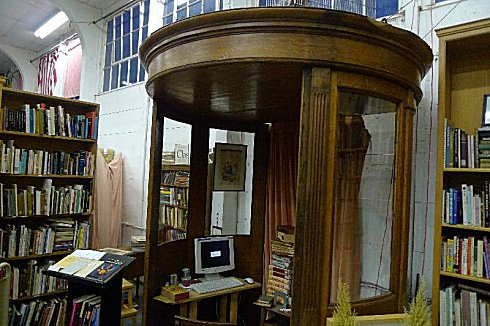
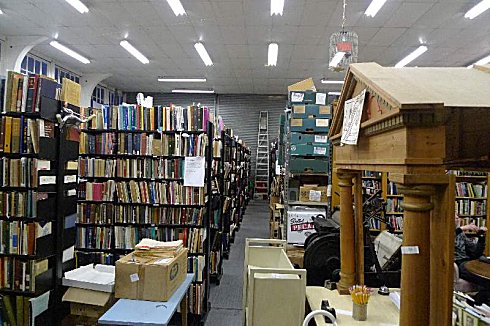
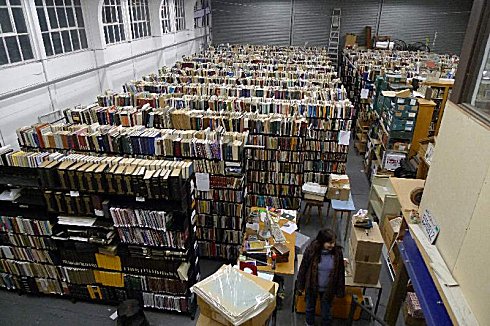



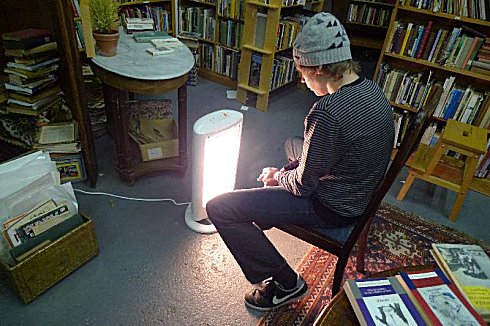
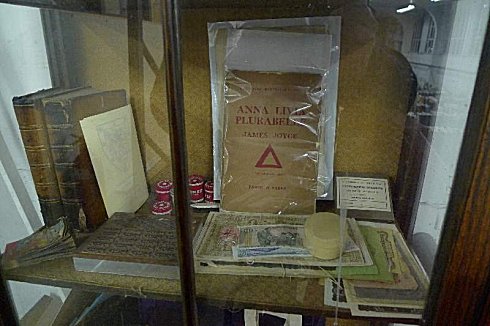
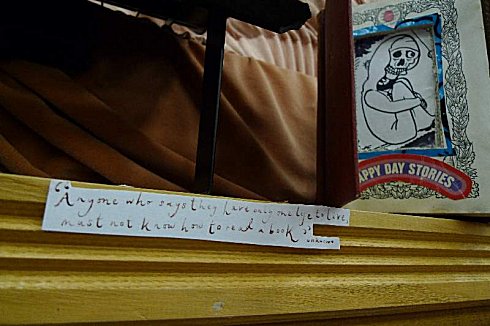
Plurabelle Books, een boekenhal in Cambridge
Een van de mooiste manieren om een nieuwe stad te verkennen vind ik nog altijd de antiquariatenroute. Natuurlijk weet ik ook wel, dat je in heel wat steden niet ver zult komen, maar als het om grotere steden gaat is het zeker het proberen waard. Want ook al vind je geen mooie boeken, je hebt wel stukjes van de stad gezien waar je anders nooit zou komen, en niet zelden zijn het de wat apartere stukjes. Zo heb ik ooit drie dagen in Berlijn doorgebracht door van de ene naar de andere tweedehandsboekenzaak te reizen. En uiteraard had ik ze aan het einde van de rit nog lang niet allemaal gezien.
Cambridge is wat dat betreft niet rijk gezegend, zo merkte ik onlangs tijdens een kort bezoek aan de beroemde Engelse universiteitsstad. Maar gelukkig was er die voorbijganger die ons – vader en zoon – attendeerde op een enorme ‘hal vol boeken’ die zich op een soort bedrijfsterrein achter het station moest bevinden.
En zo liepen we tegen de avond door de regen de stad uit, sloegen een zijweg in, passeerden een sportcentrum, geloofden er eigenlijk al niet meer in en zagen opeens een groot gebouw waar een bord op stond met de woorden Plurabelle Books. Er brandde gelukkig nog licht, de deur was open en we stonden opeens in – inderdaad – een grote hal vol boeken. Geen mens te bekennen. Wat wel meteen opviel was dat een deel van de ruimte ingericht was als een bescheiden antiquariaat.
Ik was al een tijdje aan het rondkijken toen er gestommel klonk van een ruimte boven. Er kwam iemand een trap afgelopen, een vrouw. Ze stelde zich voor als Laura en vertelde dat de hal en boeken eigendom waren van een persoon die in California woonde. En dat zij samen met een paar anderen de zaak runde. Anders dan de boeken in het ‘winkeltje’ waren alle boeken in de kasten – verreweg de grootste partij – niet geordend. “Maar je kunt wel naar titels zoeken via onze website.”
Ik liet me echter liever verrassen door wat ik op de honderden meters planken zag staan. Bijna uitsluitend wetenschappelijke literatuur. Van medische naslagwerken vol akelige ziektes tot boeken over filosofie, van taalstudies tot sociologische proefschriften.
Uiteindelijk vond ik toch nog een aardig boek in het winkeltje: ‘Portrait of New York’ van Cecil Beaton, één van de befaamdste Britse fotografen van de vorige eeuw. “One pound”, zei Laura. Een leuke meevaller. Mijn oog viel even later op een vitrine waarin – nota bene tussen blikjes leukoplast en een doosje injectienaalden – een boekje stond dat de naam van deze merkwaardige boekenhal verklaarde: ‘Anna Livia Plurabelle’ van James Joyce (‘one shilling net’). Maar nog mooier vond ik de tekst die ik een stukje verderop tegenkwam:
Anyone who say they have only one life to live
must not know how to read a book
Want dat is natuurlijk het mooie van boeken, je kunt er zoveel meer door beleven en leren dan in je eigen beperkte wereldje…
Joep Eijkens
Zie ook website: ► www.plurabellebooks.com
fleurdumal.nl magazine
More in: - Bookstores, Joep Eijkens Photos
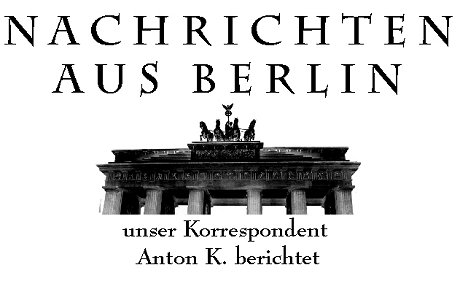
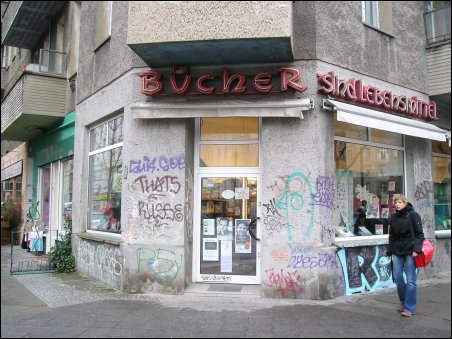
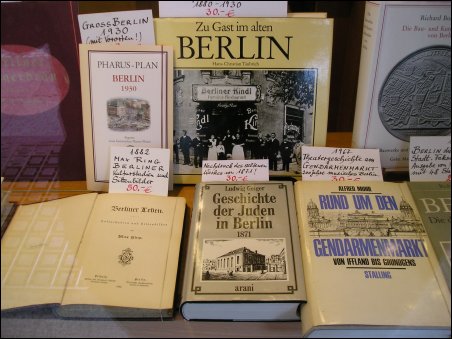
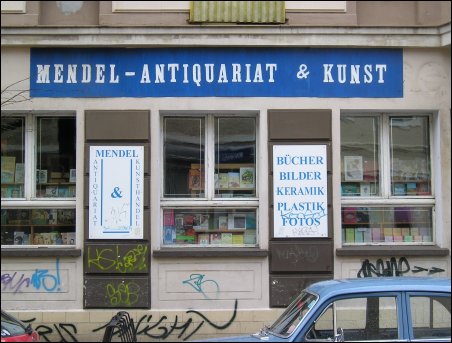
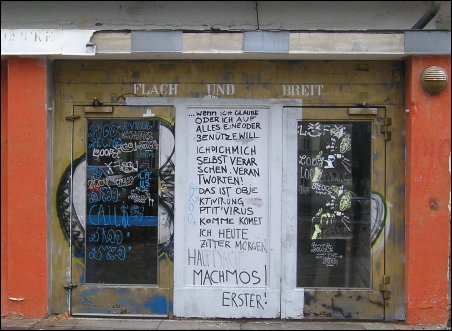
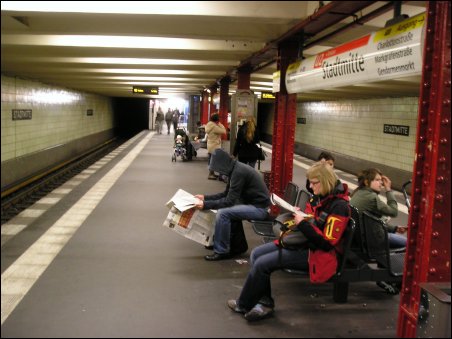


Nachrichten aus Berlin:
unser Korrespondent Anton K. berichtet
Lesen in Berlin 1
fleursdumal.nl
More in: - Bookstores, BOOKS. The final chapter?, Nachrichten aus Berlin, The Art of Reading
Thank you for reading Fleurs du Mal - magazine for art & literature